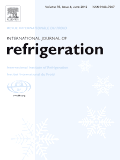
INTERNATIONAL JOURNAL OF REFRIGERATION
Scope & Guideline
Empowering researchers with cutting-edge refrigeration insights.
Introduction
Aims and Scopes
- Refrigeration Systems and Technologies:
The journal publishes research related to various refrigeration systems, including vapor-compression, absorption, and thermoelectric refrigeration. It covers the design, optimization, and performance evaluation of these systems. - Thermodynamic Analysis and Modeling:
A strong emphasis is placed on thermodynamic modeling and analysis of refrigeration cycles, including studies on energy, exergy, and environmental impacts. This includes the evaluation of low-GWP refrigerants and novel cooling technologies. - Heat Transfer and Fluid Dynamics:
Research on heat transfer mechanisms, fluid dynamics, and phase change phenomena in refrigeration systems is a core focus. This includes studies on boiling, condensation, and heat exchanger performance. - Refrigerants and Working Fluids:
The journal explores the development and evaluation of refrigerants, especially low-GWP and natural refrigerants. It addresses their thermophysical properties, safety, and environmental impacts. - Sustainable Refrigeration Solutions:
There is a growing interest in sustainable refrigeration technologies, including energy recovery systems, solar-assisted cooling, and the use of advanced materials like metal-organic frameworks for dehumidification. - Application Studies:
The journal features application-based studies in various fields such as food preservation, HVAC systems, and industrial refrigeration, highlighting practical implications and innovations. - Control Strategies and Fault Diagnosis:
Research on intelligent control strategies, fault diagnosis, and predictive maintenance in refrigeration systems is increasingly relevant, leveraging machine learning and data-driven approaches.
Trending and Emerging
- Low-GWP Refrigerants and Alternatives:
Research on low-global warming potential refrigerants is rapidly increasing, reflecting global regulatory trends and the urgent need for environmentally friendly cooling solutions. - Machine Learning and AI Applications:
The application of machine learning and artificial intelligence for predictive maintenance, fault diagnosis, and optimization of refrigeration systems is emerging as a significant trend. - Advanced Heat Transfer Technologies:
There is a growing focus on advanced heat transfer technologies, including the use of nanofluids, phase change materials, and optimized heat exchanger designs to enhance efficiency. - Hybrid Refrigeration Systems:
Research on hybrid systems that combine various cooling technologies (e.g., absorption and vapor compression) is gaining traction, highlighting innovative approaches to energy efficiency. - Energy Recovery and Integration:
The integration of energy recovery systems within refrigeration cycles to improve overall system efficiency and sustainability is becoming a prominent research area. - Sustainable Cooling Solutions:
There is an increasing emphasis on sustainable cooling technologies, including solar-assisted refrigeration and the use of renewable energy sources to power cooling systems. - Smart Refrigeration Systems:
The trend toward smart refrigeration systems that utilize IoT and sensor technologies for real-time monitoring and control is emerging, addressing the need for enhanced operational efficiencies.
Declining or Waning
- Traditional Refrigeration Technologies:
There is a noticeable decline in papers focused on conventional refrigeration technologies without consideration of sustainability or efficiency improvements, reflecting a shift toward more innovative and eco-friendly solutions. - Basic Refrigeration Cycle Studies:
Research that solely focuses on basic thermodynamic cycles without the integration of advanced technologies or materials is becoming less frequent, as the field evolves to address more complex challenges. - Single-Phase Refrigeration Systems:
There is a waning interest in single-phase systems, with a shift towards multi-phase and hybrid systems that offer enhanced performance and efficiency. - Non-Environmental Impact Studies:
Papers that do not consider the environmental implications of refrigeration technologies are appearing less often, as there is a growing emphasis on sustainability and eco-friendliness in the research community. - Generic Heat Transfer Studies:
Research that lacks specific applications or innovative approaches in heat transfer mechanisms is declining, as the focus moves towards practical and applied research with clear implications for real-world systems.
Similar Journals
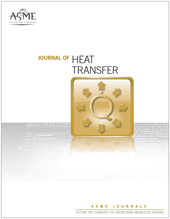
JOURNAL OF HEAT TRANSFER-TRANSACTIONS OF THE ASME
Unveiling Cutting-Edge Discoveries in Thermal Science.JOURNAL OF HEAT TRANSFER-TRANSACTIONS OF THE ASME, with ISSN 0022-1481 and E-ISSN 1528-8943, is a leading publication in the field of heat transfer, mechanical engineering, and related disciplines, published by the renowned American Society of Mechanical Engineers (ASME). This esteemed journal, which has been in circulation since 1945, provides a platform for novel research findings and reviews that the mechanical engineering community can rely upon, contributing significantly to the advancement of knowledge in heat transfer processes. The journal is recognized for maintaining a strong impact in several categories, attaining Q2 quartile rankings in Condensed Matter Physics, Mechanical Engineering, and Mechanics of Materials, reflecting its influential role in shaping scientific dialogues. With a commendable Scopus ranking, including a percentile of 63rd in Mechanical Engineering, it attracts submissions from leading researchers and industry professionals alike. Although access options are currently undergoing changes, the commitment to disseminating cutting-edge research remains steadfast. Gathering insights from historical and contemporary studies, the JOURNAL OF HEAT TRANSFER stands as a vital resource for those aiming to innovate in heat transfer technologies and methodologies.
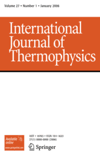
INTERNATIONAL JOURNAL OF THERMOPHYSICS
Unveiling the Science of Heat and MatterInternational Journal of Thermophysics, published by Springer/Plenum Publishers, is a premier platform for the dissemination of high-quality research in the field of thermophysics, particularly focusing on the intricate relationships between thermal properties and their applications across various scientific disciplines. With an ISSN of 0195-928X and an E-ISSN of 1572-9567, the journal has established a respected presence in the academic community since its inception in 1980, with a converged publication timeline extending to 2024. Categorized in the Q2 quartile for Condensed Matter Physics in 2023 and maintaining impressive Scopus rankings—such as #39 in Fluid Flow and Transfer Processes and #178 in Condensed Matter Physics—the journal serves as a vital resource for researchers and professionals aiming to advance knowledge in the thermal sciences. Though not an open-access journal, it remains accessible through institutional subscriptions. The International Journal of Thermophysics is committed to fostering innovative research and interdisciplinary collaboration, ensuring that it remains at the forefront of thermophysical studies.

JOURNAL OF ENHANCED HEAT TRANSFER
Innovating Thermal Solutions for Tomorrow's ChallengesThe JOURNAL OF ENHANCED HEAT TRANSFER, published by BEGELL HOUSE INC, is a prominent resource for researchers and professionals in the fields of mechanical engineering, fluid flow and transfer processes, and condensed matter physics. With a history spanning from 1993 to 2024, this journal offers a platform for disseminating cutting-edge research and innovations that enhance our understanding of heat transfer phenomena. Although it operates under a traditional subscription model, its impressive standing is underscored by its Scopus rankings—positioned within the 59th percentile for Mechanical Engineering and 58th percentile for Fluid Flow and Transfer Processes. Additionally, it holds Q2 and Q3 categorizations in relevant fields, reflecting its importance in advancing knowledge and applications in heat transfer technology. This journal effectively bridges the gap between theoretical insights and practical solutions, making it an indispensable tool for academics, industrial practitioners, and students eager to explore advancements in thermal management and efficiency.
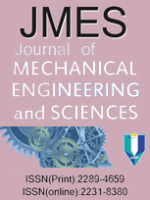
Journal of Mechanical Engineering and Sciences
Connecting Global Minds in Mechanical Engineering ResearchThe Journal of Mechanical Engineering and Sciences (ISSN: 2289-4659, E-ISSN: 2231-8380), published by UNIV MALAYSIA PAHANG, is a prominent open access journal established in 2011, dedicated to advancing the field of mechanical engineering and associated sciences. Covering a wide array of topics from industrial manufacturing processes to computational mechanics, the journal serves as a vital platform for researchers, professionals, and students to disseminate innovative findings and methodologies. With impressive Scopus rankings, including a place in the 60th percentile for Industrial and Manufacturing Engineering, the journal holds a significant position among its peers, facilitating global academic discourse. Located in Kuantan, Pahang, Malaysia, the journal emphasizes accessibility and collaboration within the engineering community, encouraging submissions that contribute to both theoretical and applied aspects of mechanical engineering.
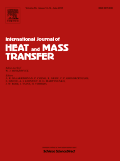
INTERNATIONAL JOURNAL OF HEAT AND MASS TRANSFER
Fostering Cutting-Edge Discussions in Thermal DynamicsINTERNATIONAL JOURNAL OF HEAT AND MASS TRANSFER is a premier, peer-reviewed academic journal published by PERGAMON-ELSEVIER SCIENCE LTD, focusing on the vital fields of condensed matter physics, fluid flow, and transfer processes, as well as mechanical engineering. With an impressive impact factor and consistently ranked in the Q1 quartile across multiple engineering and physics categories, this journal stands out for its rigorous scholarship and relevance to advancements in heat and mass transfer phenomena. Spanning from 1960 to 2024, it serves as a critical platform for researchers and professionals aiming to disseminate innovative findings and foster cutting-edge discussions in these interconnected domains. Though it operates on a subscription model, readers benefit from a comprehensive archive that covers seminal studies and contemporary advancements. Academics and practitioners alike can deepen their understanding of the complex interplay between heat and mass transfer, which is essential for numerous applications in engineering and scientific research.

Frontiers in Heat and Mass Transfer
Bridging Gaps in Scientific UnderstandingFrontiers in Heat and Mass Transfer is a premier open-access journal published by TECH SCIENCE PRESS that focuses on the interdisciplinary field of heat and mass transfer. Established in 2010, this journal has been pivotal in disseminating high-quality research aimed at advancing the understanding of energy and material transport phenomena. With an impressive commitment to open access, it ensures that all published articles are readily available to researchers, practitioners, and students globally, promoting knowledge sharing and collaboration. The journal currently holds a Q3 ranking in key categories such as Engineering, Materials Science, and Physics and Astronomy, as well as notable positioning in Scopus rankings. With a forward-looking scope extending from 2010 to 2024, Frontiers in Heat and Mass Transfer continues to be an essential platform for innovative research, fostering the development of practical applications across various scientific and engineering domains. We invite you to explore the latest contributions to this evolving field and consider this journal as a vital resource for your academic and professional growth.

Interfacial Phenomena and Heat Transfer
Unveiling the Complexities of Interfacial DynamicsInterfacial Phenomena and Heat Transfer is a leading academic journal published by BEGELL HOUSE INC that has rapidly established itself as an essential resource for scholars and industry experts in the fields of engineering, fluid flow, and chemical processes. With an ISSN of 2169-2785 and E-ISSN 2167-857X, this journal focuses on the critical interdisciplinary aspects of heat transfer and interfacial phenomena, offering insights that span across mechanical engineering, chemical engineering, and physical sciences. Despite its relatively recent inception in 2017, it has garnered respectable recognition, with a 2023 Scopus rank placing it in the Q3 category within the disciplines of Engineering (miscellaneous) and Fluid Flow and Transfer Processes, making it a pertinent publication for those interested in cutting-edge research. As researchers and professionals navigate the complexities of interfacial dynamics, Interfacial Phenomena and Heat Transfer serves as a pivotal platform, publishing high-quality, peer-reviewed articles that aim to advance knowledge and stimulate further investigation in this increasingly vital domain.

ISI Bilimi ve Teknigi Dergisi-Journal of Thermal Science and Technology
Connecting Scholars Through Cutting-Edge Thermal ResearchISI Bilimi ve Teknigi Dergisi-Journal of Thermal Science and Technology, published by the Turkish Society of Thermal Sciences and Technology, serves as a pivotal platform for disseminating cutting-edge research in the fields of thermal science, engineering, and materials science. With an ISSN of 1300-3615, this journal not only addresses critical advancements from 2008 to 2013 and 2015 to 2023, but also operates under the auspices of rigorous peer review, contributing to its reputable standing in academia. As a Q4 ranked journal in various disciplines including Atomic and Molecular Physics, Engineering, and Materials Science, it offers researchers and professionals essential insights, though it does not currently operate under an open access model. Situated in Ankara, Turkey, this journal is key to fostering collaboration and innovation among scholars, making it an indispensable resource for students and professionals eager to engage with the latest thermal science methodologies and technologies.
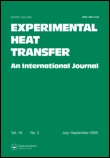
EXPERIMENTAL HEAT TRANSFER
Unleashing Experimental Insights in Heat TransferEXPERIMENTAL HEAT TRANSFER, published by Taylor & Francis Inc, is a leading journal in the fields of heat transfer, control and systems engineering, and instrumentation, with a strong impact factor evidenced by its placement in the second quartile (Q2) for relevant categories as of 2023. With ISSN 0891-6152 and E-ISSN 1521-0480, the journal has been an essential platform for researchers since its inception in 1987, facilitating the dissemination of innovative research, experimental methods, and advancements in thermal engineering. This journal, based in the United Kingdom, focuses on both applied and theoretical aspects of heat transfer, engaging a diverse audience of professionals and students keen on the latest scientific breakthroughs in the domain. With its solid Scopus rankings, including being in the top 76th percentile in Physics and Astronomy: Instrumentation, EXPERIMENTAL HEAT TRANSFER continues to be a vital resource for advancing knowledge and fostering collaboration among the academic community.

Journal of Nanofluids
Exploring the Future of Fluid Dynamics and NanotechnologyJournal of Nanofluids, published by AMER SCIENTIFIC PUBLISHERS, is a leading international journal dedicated to the burgeoning field of nanofluid technology which bridges the areas of fluid dynamics and nanotechnology. With an ISSN of 2169-432X and E-ISSN of 2169-4338, this journal has established itself as a valuable resource for researchers and professionals in Mechanical Engineering and Chemical Engineering, particularly in the domains of fluid flow and transfer processes. Its prestigious standing is reflected in the 2023 Scopus rankings, positioning it in the 79th percentile for Mechanical Engineering and the 78th percentile for Fluid Flow and Transfer Processes. Although coverage has been discontinued in Scopus since 2021, the journal maintains a Q2 category ranking in both relevant fields, emphasizing its commitment to high-quality and impactful research dissemination. This journal aims to foster innovation and collaboration among scientists and engineers worldwide, providing a platform for groundbreaking research, reviews, and discussions on nanofluids, their properties, and applications. As an essential addition to the library of any researcher or student vested in advanced fluid dynamics, the Journal of Nanofluids serves as a pivotal conduit for advancing knowledge and technology in this exciting and evolving field.